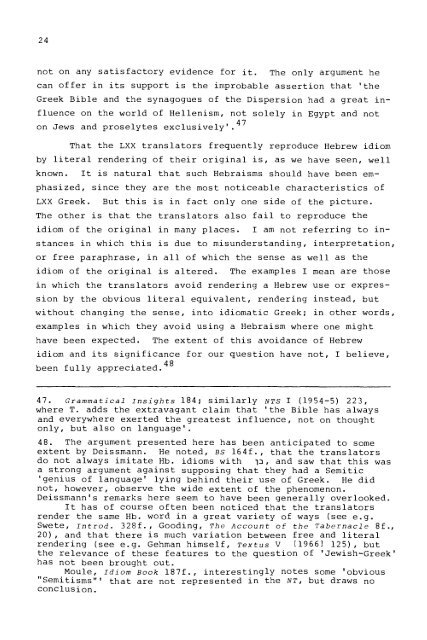A Lexical Study of the Septuagint Version of the Pentateuch
A Lexical Study of the Septuagint Version of the Pentateuch
A Lexical Study of the Septuagint Version of the Pentateuch
Create successful ePaper yourself
Turn your PDF publications into a flip-book with our unique Google optimized e-Paper software.
not on any satisfactory evidence for it. The only argument he<br />
can <strong>of</strong>fer in its support is <strong>the</strong> improbable assertion that '<strong>the</strong><br />
Greek Bible and <strong>the</strong> synagogues <strong>of</strong> <strong>the</strong> Dispersion had a great in<br />
fluence on <strong>the</strong> world <strong>of</strong> Hellenism, not solely in Egypt and not<br />
47<br />
on Jews and proselytes exclusively'.<br />
That <strong>the</strong> LXX translators frequently reproduce Hebrew idiom<br />
by literal rendering <strong>of</strong> <strong>the</strong>ir original is, as we have seen, well<br />
known. It is natural that such Hebraisms should have been em<br />
phasized, since <strong>the</strong>y are <strong>the</strong> most noticeable characteristics <strong>of</strong><br />
LXX Greek. But this is in fact only one side <strong>of</strong> <strong>the</strong> picture.<br />
The o<strong>the</strong>r is that <strong>the</strong> translators also fail to reproduce <strong>the</strong><br />
idiom <strong>of</strong> <strong>the</strong> original in many places. I am not referring to in<br />
stances in which this is due to misunderstanding, interpretation,<br />
or free paraphrase, in all <strong>of</strong> which <strong>the</strong> sense as well as <strong>the</strong><br />
idiom <strong>of</strong> <strong>the</strong> original is altered. The examples I mean are those<br />
in which <strong>the</strong> translators avoid rendering a Hebrew use or expres<br />
sion by <strong>the</strong> obvious literal equivalent, rendering instead, but<br />
without changing <strong>the</strong> sense, into idiomatic Greek; in o<strong>the</strong>r words,<br />
examples in which <strong>the</strong>y avoid using a Hebraism where one might<br />
have been expected. The extent <strong>of</strong> this avoidance <strong>of</strong> Hebrew<br />
idiom and its significance for our question have not, I believe,<br />
4 8<br />
been fully appreciated.<br />
47. Grammatical Insights 184; similarly NTS I (1954-5) 223,<br />
where T. adds <strong>the</strong> extravagant claim that '<strong>the</strong> Bible has always<br />
and everywhere exerted <strong>the</strong> greatest influence, not on thought<br />
only, but also on language'.<br />
48. The argument presented here has been anticipated to some<br />
extent by Deissmann. He noted, BS 164f., that <strong>the</strong> translators<br />
do not always imitate Hb. idioms with ·ρ , and saw that this was<br />
a strong argument against supposing that <strong>the</strong>y had a Semitic<br />
'genius <strong>of</strong> language 1<br />
lying behind <strong>the</strong>ir use <strong>of</strong> Greek. He did<br />
not, however, observe <strong>the</strong> wide extent <strong>of</strong> <strong>the</strong> phenomenon.<br />
Deissmann's remarks here seem to have been generally overlooked.<br />
It has <strong>of</strong> course <strong>of</strong>ten been noticed that <strong>the</strong> translators<br />
render <strong>the</strong> same Hb. word in a great variety <strong>of</strong> ways (see e.g.<br />
Swete, Introd. 328f., Gooding, The Account <strong>of</strong> <strong>the</strong> Tabernacle 8f.,<br />
20) , and that <strong>the</strong>re is much variation between free and literal<br />
rendering (see e.g. Gehman himself, Textus V [19661 125), but<br />
<strong>the</strong> relevance <strong>of</strong> <strong>the</strong>se features to <strong>the</strong> question <strong>of</strong> 'Jewish-Greek'<br />
has not been brought out.<br />
Moule, idiom Book 187f., interestingly notes some Obvious<br />
"Semitisms"' that are not represented in <strong>the</strong> NT, but draws no<br />
conclusion.

















